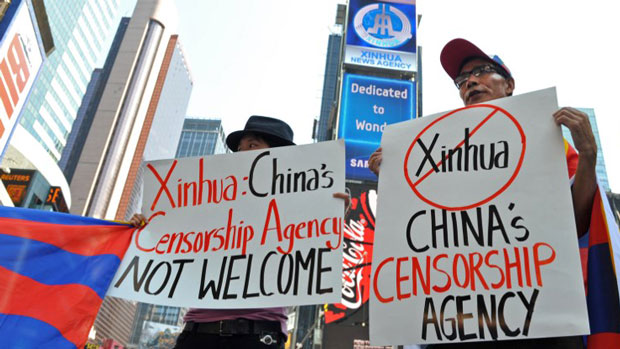The general manager of the Houston Rockets basketball team, Daryl Morey, triggered a firestorm in China when he tweeted: “Fight for freedom, stand with Hong Kong.” His actions saw Chinese businesses cutting ties with him, the Rockets and the NBA. Morey even saw criticism from the Chinese government itself. Ultimately, the tweet was deleted and Morey, the Rockets and the NBA issued apologies. The Chinese Establishment won that round.
This is not the only case of American institutions bending to the will of the Chinese Establishment, a term used here to describe the Government of the People’s Republic of China (PRoC), the Chinese Communist Party and the many corporations owned or affiliated with the prior two groups.
It is hardly a secret that the Chinese Establishment censors the free speech of its people and spreads propaganda within its borders. This is not unique to China, but the Committee to Protect Journalists rates China as the 8th most censored country in the world and the worst jailer of journalists. It’s easy to understand why: the Chinese Establishment does not want the Chinese people to know of its current mass internment of Uighurs, ongoing organ harvesting campaigns, rapidly developing mass surveillance state or other past atrocities.
This regime reigns over more than 1.4 billion people and wields the power of an economy that is, by some measures, the largest and most important in the world. Accordingly, China is positioning itself to become a global superpower, stating that it wants to unseat the United States as a hegemonic power. The Chinese government has therefore begun its ambitious Belt and Road Initiative, an infrastructure investment project across 120 countries, in order to support Chinese economic expansion in new areas and (supposedly) aid foreign economies simultaneously. Even this plan raises suspicions, in that it may be a self-serving plan to expand Chinese influence and catch nations in debt traps.
The Chinese Establishment has also taken steps to bolster its soft power by expanding its cultural reach worldwide, including in the United States.
The most distinct example is the spread of Chinese State Media, such as Xinhua News Agency, China Daily, Chinese Global Television and Global Times, which all have strong ties to the Publicity Department of the Communist Party of China. These groups publish seemingly innocuous pieces, but mix in Chinese Establishment propaganda, like false stories on the Hong Kong protests intended to villainize this pro-democracy movement.
These publications have gained a notable foothold in the U.S. China Daily sells over 170,000 copies in the U.S. weekly. Inserts from the China Daily can be found in The Washington Post. Xinhua News Agency advertises on the screens overlooking Times Square, asserting China’s rights to the South China Sea. Production centers for Chinese Global Television can be found in Washington with instructions from Chinese “Paramount Leader” Xi Jinping to “spread China’s voice…and showcase China’s role as a builder of world peace.”
These groups have to register with the Department of Justice as foreign agents; however, little else is done to curtail them. This is despite the fact that the U.S. China Economic and Security Review Commission recognizes that the motive of these publications are to “[act as intelligence agencies] by gathering information and producing classified reports for the Chinese leadership,” as well as “exert greater control over how China is depicted globally.”
Chinese news has not supplanted American and European media in the US and will not anytime soon. Nonetheless, someone is regularly consuming this news media that comes straight from the Chinese Communist Party, through these avenues and many others. It should be noted that the United States should not, and for the most part does not, have any issue with consuming media from foreign nations such as Great Britain, Japan or India, due to the fact that the views of those countries generally align with those of the United States. China is a different case though, as these state-run productions are intentionally distributing falsehoods for the sole purpose of expanding the influence and prestige of the Chinese Establishment.
Moreover, many companies must rely on China for printed media, as over 10 percent of all global printing now occurs in China. The Chinese government ensures no printed material
that conflicts with its agenda is exported. The most easily visible example of this: maps. China has an intense focus its territorial integrity and will not export maps that show Hong Kong, Tibet, Taiwan or other disputed areas as not part of the PRoC. Such “problem maps”, as they are termed in Chinese state-run media, are incinerated and used to warn companies of their “obligations to the nation.” Sadly, this means that many companies which use Chinese printers must accept the Chinese Establishment’s version of events.
A similar dilemma arose with American clothing company Gap. In 2018, Gap found itself ensnared in controversy because of Gap shirts that displayed a map of China without Taiwan. Instead of standing up to the Chinese Establishment, Gap “recognized” that it had “failed to reflect the correct map of China.” Gap removed the shirt from shelves in China and destroyed them.
The Chinese Establishment has developed a habit of pressuring U.S. businesses into tailoring their products to fit the Communist Party line.
In 2018, U.S. airlines were asked by the Civil Aviation Administration of China to recognize on their websites that Hong Kong, Macau and Taiwan are part of the PRoC. The White House condemned such demands as “Orwellian”, but American Airlines complied, as did others.
Video game giant Activision Blizzard bent to the Chinese Establishment by banning a player from tournaments from its game “Hearthstone” and revoked his prize money for shouting, “Liberty for Hong Kong. Revolution of our age!” during a match.
The American financial giant JP Morgan Chase took similar pro-China action when it changed policy to display Hong Kong, Macau and Taiwan as part of China.
Apple pulled apps that were helping organize the Hong Kong protests from its App Store upon the Chinese Establishment’s demands.
Perhaps the most horrific of all, Google custom designed a new search engine called “Dragonfly” that will “block internet users in China from seeing web pages that discuss human rights, peaceful protests, democracy and other topics blacklisted by China’s authoritarian government.”
The NBA. Gap. American Airlines. Activision Blizzard. JP Morgan Chase. Apple. Google. The list goes on. These are massive American companies that play a major role in our lives, and they have all bent to the will of a tyrannical, foreign government. It is concerning for any country when a foreign nation attempts to subvert norms in this manner, much more when a dictatorship does so in a global superpower like the United States, as it will inevitably have an affect on all of global politics.
How does China do it? The biggest factor is its massive consumer base. China has a burgeoning middle class that rivals America’s and will likely outshine it in coming decades. Companies salivate at the thought of snatching up market share in this rapidly expanding market and are therefore willing to take drastic steps as not to fall behind.
The Chinese Establishment can regulate what hits shelves across the country and effectively chooses which businesses succeed in China. For that reason, these businesses do not want to cross the Chinese Establishment — that is to say, corporations are more willing to walk the Communist Party line than lose out on profits. Next to nothing is being done to stop this.
Similar influence has seeped into United States educational institutions, long considered a sign of American prestige. One method is the establishment of “Confucius Institutes”, organizations that establish partnerships with educational institutes to teach Chinese language and culture. All are funded and organized by the Chinese Ministry of Education.
Confucius Institutes are established at 81 American universities, including 3 UC campuses (not including UC Berkeley). Such programs seem benign, but with the Chinese Establishment’s tendency to propagandize and censor, suspicion is warranted. This is emphasized by cases where Confucius Institutes twisted the truth on subjects including, unsurprisingly, Taiwan and Hong Kong. Notably, a Senate committee found that Confucius Institutes lack transparency, provide China with nonreciprocal access to American schools and are subject to little government oversight.
The Chinese Establishment’s influence over American academia does not stop here. The Chinese government uses financial incentives to get Chinese Students and Scholars Associations (CSSAs) at American universities to comply with its wishes, including praising Chinese dignitaries, restricting membership along ideological lines and organizing sessions to watch and discuss Chinese Communist Party proceedings.
Even entire universities bend to Chinese Establishment pressure. For example, North Carolina State University cancelled a visit from the Dalai Lama due to North Carolina’s trade with China. Many professors and graduate students have also stated they censor themselves for fear of retribution from the Chinese Establishment. An extensive report from The New Republic uses 100 interviews with university affiliates and additional examples to detail the academic self-censorship crisis caused by fear of Chinese retribution.
Universities serve a vital role in the US. They often produce primary information on crucial topics that is then utilized by the government and everyday citizens in making vital decisions. If colleges cannot be relied upon to produce trustworthy material on China, its government and any crises that develop therein, then a critical part of America’s national security has broken down. This is unacceptable.
Media. Corporations. Universities. These are the building blocks of American society, and they have all been influenced by the Chinese Establishment. Actions must be taken by these groups and governments at every level to counteract the encroachments of a dictatorial government into our republic.
In fact, government is one of the only parts of our society that seems to have gone untouched by the Chinese Communist Party. We should be wary of that, as other hostile governments have already taken interest, as made infamous by Russian interference in the 2016, 2018 and 2020 elections. Furthermore, China has already tried to influence politics in other nations, such as Australia, though as of yet, it has had little tangible success. It can happen here.
This is not a doomsday prophecy. America is currently safe. Nonetheless, the United States must recognize China as one of many existential threats that currently besiege the current global world order while still confronting the similarly monumental issues posed by climate change and the Russian Federation.
More importantly, America can no longer assume global supremacy going forward as we have since World War II. China, and other nations like India, will soon hold heightened positions of power in a rapidly changing global political landscape that the United States will have to adjust to. Work should be done to incorporate these powers into the rules-based system of cooperation that sprung up largely between American and European powers after World War II. No matter how the balance of power shifts, the United States and its allies should continue to work to support freedom of the press and other liberal norms both abroad and at home.
Featured Image Source: Agence France-Presse






Be First to Comment